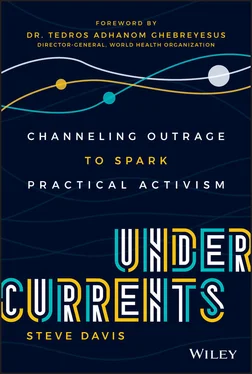I'd formed all kinds of unflattering opinions about this student and what his life post‐Stanford would look like. But over the summer, Michael emailed me. He was working for a presidential candidate—someone I'd describe as a centrist—and he was collaborating on a book about values‐based business practices, the importance of business in society and how it could be used to advance social innovation. This blew up all of my preconceptions. It also reminded me that today's young executives view the world very differently from those of previous generations. They appreciate that we need to reengineer our approach to global problems if we are going to sustain ourselves as a species. That group inspires me.
This book is also written for seasoned business leaders like the executives at French insurance giant AXA. Though it is among the oldest and largest corporations in the world, AXA's top managers are determined to reinvent their company for the twenty‐first century. Its board regularly solicits advice from social innovation experts in health, environmental science, digital transformation, and inclusive economics. I leaped at the chance to be part of this advisory team because bringing business into the work of social change is essential. And because helping a corporation think through how to divest from tobacco or coal, invest in disease prevention, and support gender inclusion actually helps their bottom line, ultimately benefiting employees, the communities they serve, and the globe overall.
Beyond corporate titans and the young people who aspire to join them, there are other types of readers I am speaking to very directly: policymakers and donors who influence trends in global development; people who have little money or influence but want to learn how to become more engaged; and citizens like my friend Heather, a former teacher turned stay‐at‐home mom, who follows politics with great outrage, worries about her children's future, and wants to find a way to stay positive.
My aim is to help turn the frustration of these readers into optimism and, ideally, activism. But I am no Pollyanna. There is real cause for outrage. And the obstacles we face—whether confronting growing race‐based disparities, economic inequality, political corruption, or climate change—are enormous. I could write a whole other book on what I consider to be fundamental flaws in the field of global health and development, which were thrown into even starker relief by the COVID‐19 pandemic. It is this very outrage that offers the opportunities to spark activism and inspire hope. And there are also signs of important change on the horizon. For the first time in history, two‐thirds of all people on this planet have access to infectious disease prevention and newborn care. More people than ever before have reached the middle class, and almost 90 percent of adults can read. Those are incredible shifts, and they portend rapid progress to come.
In Undercurrents , I'll zero in on stories from my own life to illustrate important principles for driving change, moments that could be those of any determined global citizen. My journey has not been the stuff of cinematic tragedy or epiphany, yet I've been able to engage deeply in a number of critical social issues as a student, teacher, frontline worker, and leader. Over the 40 years since that soccer game in Thailand, I've worked hard at figuring out how to capitalize on broad social undercurrents to advance larger social‐justice goals. By the end of this book, I hope you'll be able to do the same.
These are perilous times, and I understand why anyone might feel discouraged. But the levers for historic change are within our grasp. Undercurrents is a blueprint for how to use them and move from outrage to optimism.
1 Reading the Water Undercurrents Powering My Journey in Practical Activism
Life is like the sea. Its tides and currents sometimes take a man to distant shores that he never dreamed existed .
—Jocelyn Murray , The English Pirate
I STARTED OUT as an unlikely candidate for global activism: a kid from a rural town of 4,000 people, most of them deeply conservative and proudly isolated from many of the comings and goings of the wider world. I grew up in the ranching community of Dillon, Montana, in a high mountain valley rimmed by stunning peaks running along the Continental Divide. There, the land and the water ruled supreme. So, like many boys in Dillon, by age 13 I had my first job: irrigating our fields of alfalfa and barley. This was in the early 1970s, before industrial‐grade sprinklers were widely available, so my Uncle Roy would plow the land, and then we'd walk it, surveying to determine its slope and where water might pool. Next, we'd dig a network of ditches to capture the water streaming from one of the valley's main creeks, and into these ditches I'd drop canvas dividers that worked like temporary dams, diverting the water into still more ditches and pushing it farther into our fields. The trick was getting adequate water to flow over the largest possible area without washing out and drowning our crops.
By high school I'd become quite good at “reading the water,” as Uncle Roy used to say, so for several years I was anointed “the Irrigator.” Old farmhands sometimes used the title with reverence, but mostly it came with a knowing smirk from family members, who knew this was about the only ranch job I could handle. Still, I loved those long, hot days in the fields, analyzing water. On summer evenings, I used the same skill (less successfully) for fly fishing in the blue ribbon streams of our valley, reading the currents to determine where best to cast my line—some place that would float it into the shallows where the fish fed, but not into an eddy where it could get caught. Later, after I had left our Montana valley and was rowing crew in college, I found myself again attuned to currents and how they could hasten or hinder our quest for speed.
This instinct persisted even when I was away from water. Reading currents—whether natural, social, or economic—and channeling them has shaped my path through life. Luckily, it's also intersected with my work in activism. Among the major undercurrents powering social change during the second half of the twentieth century, four have carried me forward: first, as a young scholar and activist immersed in Chinese history, politics, and culture, just as that country was transforming itself into a world power. Then, as a gay man and human rights lawyer, benefiting from 40 years of stunning progress in consciousness around LGBTQI rights. As the Information Age dawned, I was lucky enough to be tapped to lead Bill Gates's pioneering internet firm Corbis, which leveraged digital tools to overhaul media access to art and photography; and finally, I stepped up to lead the global health and development nonprofit PATH as the world made billion‐dollar commitments to achieve the United Nations' Sustainable Development Goals (SDGs) by 2030. These four macrotrends have acted like ocean swells through my life and career, ushering me along, just as a tidal current might push a boat safely to shore.
Though I've traveled far from my Montana roots, I treasure the foundation they provided. Even as a kid, I knew I'd won the parent lottery; my mom and dad generously shared their deep work ethic, intellectual curiosity, and unconditional love with their four children, large extended family, and community. Nevertheless, I'd already swallowed the bitter taste of outrage. I was an overweight, gay kid in a Brokeback Mountain town who hadn't yet come out. I often felt isolated and angry, convinced that I was cursed to a life of loneliness and sin. It took several painful years of living in the closet during college at Princeton University before I told my family and friends—with great awkwardness and fear—the truth of who I was. For me, the journey of coming out is never fully over, and I've spent much of my life channeling this early shame into personal, political, and community transformation, as you will see across the pages of this book.
Читать дальше












